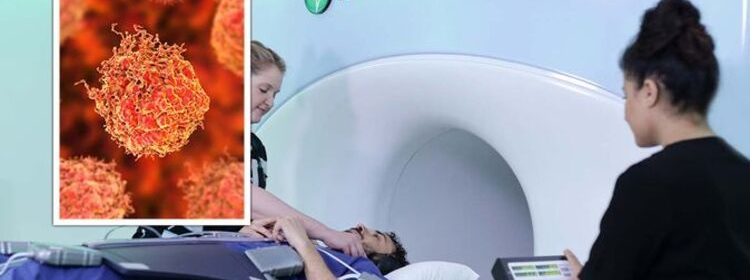Prostate cancer: ‘Groundbreaking’ radiotherapy can ‘protect healthy tissue’ from damage

Prostate cancer: Dr Philippa Kaye discusses symptoms
We use your sign-up to provide content in ways you’ve consented to and to improve our understanding of you. This may include adverts from us and 3rd parties based on our understanding. You can unsubscribe at any time. More info
It is estimated that over 14,000 men in the UK are walking around with undiagnosed prostate cancer. Getting tested for the condition might bring with it the concern of cancer treatment and its sometimes dire side-effects. Radiotherapy works by zapping tumours with high-energy radiation to destroy them. Prostate sufferer’s are often left with erectile dysfunction and incontinence as a result of radiation being beamed onto healthy tissue surrounding the tumour. When the body moves during treatment, so can the tumour which is what exposes the healthy tissue. Moreover, conventional radiotherapy usually involves over 20 sessions, which adds to the likelihood of healthy tissue becoming exposed. But thanks to the new therapy, which uses magnetic resonance (MRI) technology, people with localised cancer can undergo a treatment that uses automatic tumour targeting to avoid healthy cells.
There are estimated to be less than 100 MRI-guided radiotherapy machines, known as MR Linacs, in the world, according to Doctor Philip Camilleri of private healthcare provider GenesisCare.
GenesisCare has access to two MR Linacs, called MRIdian machines at its outpatient centres in Oxford, and Cromwell Hospital in London.
There are only four of these around the UK.
Discussing how the MRIdian machine works, consultant urological surgeon Mr Philip Charlesworth of GenesisCare explained: “The MRIdian is considered ground-breaking because it is able to turn on the radiation beam only when the tumour is positioned precisely in the treatment window and turn off the beam in an instant if the tumour moves even by a fraction – helping to protect healthy tissue from unnecessary radiation exposure.”

Peter Denley, a 72 year old hockey player from Mansfield, underwent GenesisCare MRI-guided therapy in January 2020 after being diagnosed with the disease two months earlier.
After only five therapy sessions, compared to the usual 20 with conventional radiotherapy, Denley’s cancer was cured.
His prostate-specific antigen level, which is used to measure the health of a prostate, went down from 18 to 0.3.
The more unhealthy a prostate is, the more likely PSA proteins may leak into the blood.
Although there is no official screening programme in the UK using PSA tests, people concerned about prostate cancer may enquire about them.
When he started his therapy, Denley was concerned the treatment would affect his quality of life and prevent him from being active.
“My biggest worry was not being able to play hockey again for England under 70s, but in fact I was still able to play whilst undergoing treatment – I even played squash and hockey in the weekend in between my treatments,” he said.
Commenting on the case Doctor Das of GenesisCare said: “Peter’s cancer was localised inside the prostate, meaning there was no evidence that the cancer had spread to surrounding tissues.
“This meant that he was eligible for treatment on the UK’s first MRIdian machine, at GenesisCare.”

The therapy is available for other localised cancerous tumours which are prone to move about during therapy.This includes liver and pancreatic cancer.
In 2020, GenesisCare made its treatment available without extra cost to eligible NHS patients with localised pancreatic cancer.
Alongside the development of MRI-guided radiotherapy, conventional therapy is getting better too, according to Doctor Camilleri.
He said: “Conventional radiotherapy is also improving, with conventional treatments nowadays causing less side effects than similar treatments five years ago.”
The therapy went live in 2018 at two other sites: the Royal Marsden Institute of Cancer Research and the Manchester Cancer Research Centre.
Symptoms of prostate cancerThere are no visible symptoms of prostate cancer until it has grown so large as to put pressure on the urethra – the tube which carries urine from the bladder out of the penis.
When this occurs though, people with prostate cancer may need to pee more frequently, often during the night, or need to rush to the toilet, according to the NHS.
They may also have blood in their urine or semen, difficulty in starting to pee, and a weak flow.
Source: Read Full Article